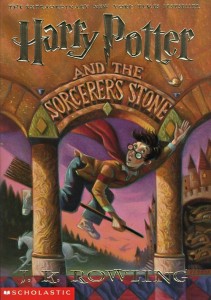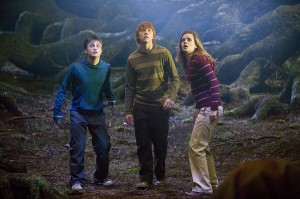 I must have been barely a teen when the Harry Potter craze struck, sweeping all our friends away with it. I don’t remember asking to read the books, or even if the first movie was out yet. I just recall that many of our friends were obsessed, and my parents made the decision to ban the series, due to the content of witchcraft.
I must have been barely a teen when the Harry Potter craze struck, sweeping all our friends away with it. I don’t remember asking to read the books, or even if the first movie was out yet. I just recall that many of our friends were obsessed, and my parents made the decision to ban the series, due to the content of witchcraft.
I don’t condemn their decision, and this isn’t an argument for whether or not you should let your own children delve into Rowling’s world. This is an account of my personal journey.
Hating Harry
Shortly after ruling that our family would not be involved in the Harry Potter craze, my mother sent me an online article that presented the magic-related content of the Harry Potter books and roundly condemned the series, along with most other magical tales.
Undoubtedly my mother’s intention was merely to educate me on her reasons for denying us the story, so that I wouldn’t resent her or feel deprived. But I took it the wrong way. I took it as a call to be militantly anti-Potter.
To my mind, J.K. Rowling’s books were dangerous, full of evil being called good, poorly written, and riddled with adverbs. I loved to debate the topic with my Potter-loving friends, often using strong words. Some of what I claimed might have been true. But some might not have been. The problem is, all of these fervent opinions were based on my ignorance of the series. I only knew hearsay, as I had never read them myself.
Over the course of my teen years and God’s gradual work in my heart, I became less strident and legalistic. Rather than blasting Harry Potter as evil, I settled into a more moderate attitude of, “Because the series presents witchcraft as good, it’s not a wise reading choice, especially for kids.”
I decided that magic in books was a risky topic overall and that as an author I’d avoid it altogether. In my mind, I drew a sharp contrast: inherent powers were okay, and acquired powers were bad. So superheroes, fairies, elves, and the like were okay because they were born with their powers. God gave them those abilities. People who did magic by incantations, calling on spirits, potions, etc. – such as the kids in Harry Potter – were only all right if they were being featured in stories as villains.

Then somebody informed me that the kids in Harry Potter were born with the ability to do magic, unlike the ordinary humans in the story, who were called Muggles, and can’t do any magic at all.
Oh.
Things suddenly got more complicated.
I was thrown for a loop, and began to question the inconsistency of my views. Why was the magic in Middle-Earth, Narnia, Never-Never Land, and other worlds fine and dandy, while Harry Potter‘s magic wasn’t?
Curiouser and Curiouser
Eventually I discovered one of my favorite websites, Speculative Faith, where I read a blog series that made a big impression on me. One of the most powerful thoughts it shared was this one:
But how should we understand witchcraft? Any definition shouldn’t come from “folk theology,” or passing resemblances, but Scripture itself. And throughout both Testaments, Scripture always defines witchcraft as actual pagan practice of false religion and even idol-worship that dishonors God. That includes trying to talk with spirits. Favoring mysticism above God’s Word. Cutting up or tattooing your body like the Canaanites did.
One might ask: do the following concepts fit inside the Biblical category of actual witchcraft? Or do they originate from popular culture, historic folklore, or perceptions of “magic”?
- Whimsical flying broomsticks.
- Cauldrons and potions with magical effects.
- “Wizards” who wear pointy hats and dress in long, shining robes.
- Disappearing from one place to appear almost instantly in another.
- Creatures such as werewolves, trolls, baselisks, centaurs, elves, goblins, and dragons.
With care, I would suggest that if you, even subtly, consider these things as exactly the same as Biblically defined practice of pagan occultism, you may have accidentally bought into some pop-culture notions yourself — and then have read those back into the Bible.
— E. Stephen Burnett
What! I had never before considered that “magic” in the Bible had a specific definition, which did not fit all magic in books and movies. Nor had I thought about some of the author’s other excellent points. (I highly recommend you read the series to see what I mean!)
I made up my mind to read Harry Potter for myself. Even if I continued to disagree with the series, at least then I would have an educated opinion and not just the huffings and puffings of my ignorant brain. Also, as a writer of speculative fiction myself, I was curious to see what made the book so incredibly popular.
And so I, Bethany, the former hater of Harry Potter, took myself to a library and checked out Harry Potter and the Sorcerer’s Stone.
Read Part II here.
Your thoughts? If you are a Christian, what is your opinion on magic in books? If you are a fantasy author, do you use it? Do you eschew it? Is it always wicked, or is there a difference between “real world” magic and “fake” magic? Does it depend on the story? I’d love to hear your reasoning on the topic.


I think that some magic is acceptable. I think that there are kinds of magic that aren’t, but I haven’t read anything like that, mostly because I’ve stayed pretty far away from that sort of book. Something that comes to mind (judging only from reviews of the book and movie, though) would be The Golden Compass.
I once wrote (well, started to write. It’s currently unfinished.) a story with elven magic. I also think that, for the most part, anything not human with magical abilities is all right. Most “magical humans” just are born that way and might not actually be human. Gandalf, for example, isn’t quite a man; he’s something else. Something more. Harry Potter magic isn’t just used for evil, but also (maybe mostly) for good.
It can be very interesting when magic is used, actually. The Binding of the Blade series by L. B. Graham uses prophets instead of magicians, which I found fascinating.
My family’s policy with Harry Potter was that one has to wait until one is oldish to read it, read Lord of the Rings, the Hobbit, and Chronicles of Narnia first, with the end to this being certain that one can distinguish fantasy from reality.
Yes, I tend to think the same way – if God wanted us humans to do magic, he would have given us that ability. Here in the real world, on earth, trying to do magic is grasping for power that should only belong to God. But angels have abilities we humans don’t have, right? So therefore it is not wrong for created creatures to have “powers”, so long as they are God-given.
About Gandalf – he’s actually a Middle-Earth version of an angel, I believe, sent to Middle-Earth to do work there.
Your family seems to have a good policy on Harry Potter. I’d make my kids wait until they were older, too, and having them read LotR and Narnia first seems like a good idea.
Yes, I agree. “Magic” that humans can do–sleight of hand things like card tricks–are more acting than anything else.
Yes, that’s certainly Gandalf. 🙂
I think it’s a good policy too. I’ve never felt burdened by it, at least. 🙂
By the way, I noticed that the link to the archives in The Queen in the Wooden Box sidebar isn’t active. So you might want to fix it. 🙂
I’m actually not sure how to put an active link in a sidebar box! So that’s as well as I cam do it right now. :/
It’ll be fine, I’m sure. I just wanted to make sure you hadn’t missed it. 🙂
Thanks for checking! 🙂
[…] end of Part I left off when I, onetime vicious detractor of Harry Potter, went to the library and checked out […]